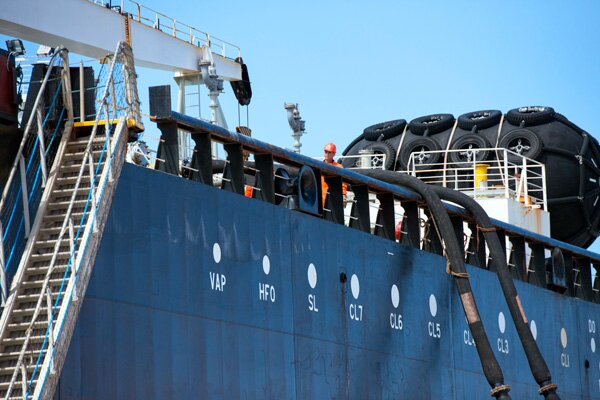Our new NorthStandard site is now live. There will be no new content or updates added to this site. For the latest information, please visit our new site north-standard.com.
Ukrainian & Russian Hostilities – Charterparty and Cover Issues
This Standard Club member alert is intended to give members broad topical guidance on some of the many issues that the shipping world currently faces as a result of the hostilities in Ukraine. Given how quickly the situation can change locally, and even from port to port, the situation in terms of liabilities remains fluid and complex. Members should therefore treat this article as offering general guidance only, and are encouraged to contact the club for assistance with particular issues or questions. This alert reflects the position as of 25 February 2022.

Owner members whose vessels are ordered, or charterer members who order vessels, to proceed to load or discharge at Ukrainian and / or Russian Black Sea ports should consider the English law charterparty and cover issues outlined below as the situation in the area develops.
1. War Risks
It is common practice to include war risks clauses in charterparties which are intended to deal with the obligations of the parties so far as War Risks are concerned. Bills of lading typically incorporate charterparty terms which include such clauses.
The terms of such clauses vary widely so it is essential to examine the actual wording carefully. The current clauses recommended by BIMCO are CONWARTIME 2013 and VOYWAR 2013, but earlier versions of these are also still in use and there are many other clauses in circulation.
Although such a clause is usually referred to as the 'war risks' clause, its application is usually not limited to situations where there has been a formal declaration of war. For example, the CONWARTIME 2013 clause defines 'war risks' broadly and, given the current uncertainty in and around Ukraine and the Black Sea, is worth setting out in full (and with our underlining to highlight the breadth):
“‘War Risks’ shall include any actual, threatened or reported:
war, act of war, civil war or hostilities; revolution; rebellion; civil commotion; warlike operations; laying of mines; acts of piracy and/or violent robbery and/or capture/seizure (hereinafter “Piracy”); acts of terrorists; acts of hostility or malicious damage; blockades (whether imposed against all vessels or imposed selectively against vessels of certain flags or ownership, or against certain cargoes or crews or otherwise howsoever), by any person, body, terrorist or political group, or the government of any state or territory whether recognised or not, which, in the reasonable judgement of the Master and/or the Owners, may be dangerous or may become dangerous to the Vessel, cargo, crew or other persons on board the Vessel.”
What rights might war risks clauses give parties?
Does either party have a right to treat the charterparty as at an end? Again, this will depend upon the wording of any cancellation provisions in the contract, and whether such rights are triggered.
For voyage charters, a war risks clause typically includes a right to cancel in specified circumstances. For example, VOYWAR 2013 allows the carrier to cancel if, in the reasonable judgment of the master and/or owners, performance of the voyage may expose the vessel to the broadly defined ‘War Risks’. This is an objective test and, for it to succeed, the English courts would look at whether master / owners formed a reasonable judgement, requiring evidence of the decision-making process, and that there was a “real likelihood” that the vessel would be exposed to war risks (see the Triton Lark 2011). For there to be a real likelihood, evidence is required not mere speculation.
In time charters, a right to cancel is much less common, but war risks clauses often provide that the vessel will not be obliged to proceed to any port (or through any area) where the master or owners reasonably judge that the vessel may be exposed to war risks. Charterers must be notified of any such refusal, which enables them to issue new voyage orders. Further, if a vessel is already in an area of danger, then it may be contractually entitled to depart.
In other multi-voyage contracts (such as contracts of affreightment), the effect of any cancelling right must be considered carefully. Depending on the wording, it may be that cancellation applies to the entire contract and not just to a particular voyage.
2. Frustration
As a matter of English law, a contract is ‘frustrated’ if an unforeseen event occurs which is outside the parties’ control and makes the contract impossible or illegal to perform, or radically transforms the nature of the contractual obligation. The effect of frustration (if established) is that both parties are released from their contractual obligations. However, frustration is rarely successful under English law, and mere delay or additional expense, such as soaring insurance costs, freight rates or bunker prices, are almost always insufficient.
The presence of a war risks clause in a contract of carriage will be relevant because a contract cannot be frustrated by changed circumstances if it makes provision for the changed circumstances in question. Even if there is no such a clause, there will still be a factual question as to whether the carriage has become impossible or radically different from that originally envisaged. If the circumstances have not changed since the time when the contract was agreed, then the contract cannot be frustrated.
While the facts in each case will need to be closely checked, it is unlikely that (for example) a time charter will be frustrated because of difficulties affecting one voyage as such difficulties would not radically affect the whole contract. However, the position may well be different with a voyage charter or bill of lading.
3. Safe port(s)
If the relevant contract is a time charter (or the relevant contract contains an express safe port warranty or includes options as to the load/discharge port), then the question of the safety of the port will arise.
It is well known that it is an implied (and often an express) term that a ship will only be ordered to a port if the ship can reach, use and return from it without being exposed to danger which cannot be avoided by good seamanship. This means that it is not just a matter of the port being safe, but also of the safety of the route to the port – this is of course particularly relevant in the context of, say, approaching Mariupol through the Sea of Azov.
If an order is given to proceed to an unsafe port, or if the situation changes after the order is given, such that the port subsequently becomes ‘unsafe’, the master/owners can reject the order and call for new orders. If the orders are complied with, and a loss is suffered because of the unsafety of the port, then charterers will be liable in damages.
That all sounds simple enough, but any decision to reject orders is one which requires very careful consideration: if it turns out that the port was safe, then the rejection was wrongful and owners may be liable in damages. In order for the port to be unsafe, the risk must be sufficient for a reasonable shipowner to refuse those orders.
4. Force majeure
Force majeure clauses may have been triggered by the developing and hostile events, which are arguably a classic type of event beyond the control of either party.
Traditionally, force majeure clauses are often considered to be of more relevance to sale contracts than charterparties. However, increasing numbers of charterparties now contain force majeure or general exceptions clauses of one kind or another, such as Shelltime 4 (see cl 27 and “act of war”), and BIMCO has recently published its timely Force Majeure Clause 2022.
Members should therefore carefully review any force majeure or general exceptions clauses (together referred to below as “force majeure clause(s)”) in their charterparties.
General points to be kept in mind include:
- The starting point is whether the force majeure clause (if any) refers to relevant triggers such as “war (declared or undeclared), warlike actions, insurrection, revolution or civil strife, piracy, civil war or hostile action”. This is taken from the BIMCO force majeure clause, but not all charterparty general exception clauses do so expressly or at all, for example, the NYPE 1946, 1993 and 2015 forms. If there is an express reference, and depending on the relevant facts at the time, then the chances of enforcement are greater.
- Did the outbreak of, say, ‘war’ or ‘warlike actions’ cause the party’s inability to perform? If a party would not have been able to perform even in the absence of the outbreak, it is unlikely that the party will be able to rely on force majeure as an excuse, even if the event falls within the force majeure provisions.
- The burden of proof is on the party seeking to rely on the exception to prove:
- a causal connection between the event (eg act of war) listed in the clause and the inability to perform; and,
- that the effects of the event could not be overcome or avoided through alternative means. If a party is able to mitigate the effects of the event through alternative means then it is likely to undermine the party’s ability to use force majeure as a valid defence.
- The party seeking to rely on the force majeure clause must strictly comply with any notice requirements. Failure to do so may well prejudice the party’s ability to rely on the majeure even if all other elements of are met.
5. Trading limits
In addition to the above, some charters may contain trading exclusions which expressly bar charterers from ordering a vessel to, say, ‘war or war like zones as declared by JWC and/or vessel’s H&M underwriters’.
If owners agree to orders to trade outside the previously agreed charterparty limits, charterers’ obligations regarding the safety of the ports / berths to which they order the vessel will remain.
Remember too that additional insurance premium may be payable, which will typically be for charterers’ account.
6. Sanction clauses
Many charters also contain sanctions clauses which specify the parties’ rights in response to sanctions implemented by various sanction authorities. In the wake of the recent sanctions announced by the US, UK and EU authorities, any sanction clause in the charterparty should be reviewed to determine whether the member has additional rights or whether the analysis of the issues noted above (eg, frustration or force majeure) are impacted by the sanction clause provisions.
7. Action points
- Review contracts to determine express rights, obligations and remedies in light of the developing facts, both in terms of events in Ukraine and Russia, but also in terms of orders provided or received. We have outlined potentially relevant issues above, but each contract will need to be reviewed on its own basis.
- Particular attention must be paid to any notice requirements and promptly provide the same as required, for example of a force majeure event, to counterparties. Failure to do so can have a severe impact on the ability to invoke such defences.
- Take (and document) reasonable steps to mitigate the impact of the decision taken. While these steps may prove futile, they may still be essential if, for example, a force majeure defence is to succeed.
8. Cover
Members are reminded that liabilities arising out of war risks (including war itself, other hostile acts and terrorism, seizure, and the use of so-called ‘weapons of war’) are excluded from normal P&I cover. However, through the International Group, the Standard Club provides war risks cover excess a member’s underlying war risks placement. It applies excess the lesser of the value of the ship or $500 million, and has a limit of $500 million.
However, the Standard Club’s War Risks Class can provide primary hull and machinery and P&I war risks cover to all Standard Club members on a mutual basis, plus fixed-premium war risks cover to non-members.
Hull war risks cover includes physical loss or damage, loss of hire, and detention and diversion expenses caused by war, civil war, revolution, rebellion, insurrection or civil strife, or any hostile act by or against a belligerent power. The limit is the hull value.
Primary P&I war risks cover provides P&I insurance for liabilities arising from war up to $500 million, irrespective of hull value.
Alternatively, members connected to Singapore may also take out primary war risks cover through the Singapore War Risks Mutual that is managed from the club’s Singapore office.
Members are reminded that both primary and excess war risk covers contain provisions whereby cover will terminate automatically upon the outbreak of war (whether there be a declaration of war or not) between any two or more of the so called ‘Five Powers’, being Russia, the United States, the UK, France and China. As matters currently stand, the conflict in Ukraine is only between Russia and Ukraine itself with no direct military involvement on the part of the United States, the UK, France or China. As a result, a member’s primary and excess war risks covers would remain in place to the extent that this state of affairs continues. However, this may change in the event that the military forces of any of the other Five Powers become directly involved in hostilities against Russia in Ukraine.
Defence (FD&D) cover with the club will respond in the usual way to contractual issues arising out of the hostilities in Ukraine.
9. Strike & Delay
Members who have taken out Strike & Delay cover with the club and have a vessel currently sailing to Ukrainian ports or any ports in the Azov Sea are at risk of being delayed due to restrictions to navigation, port closure, suspension of cargo operations in Ukrainian ports and / or the destruction of any major Ukrainian infrastructure. If so, the members should notify the club as soon as possible so that we can advise on members’ rights of recovery.
In the meantime, members should be aware of the club’s Strike & Delay rules and in particular rule 4.3 which provides that ‘There shall be no recovery, save as provided in rules 3.2 … and 3.34, in respect of any loss incurred as a result of war, civil war, or any hostile act by or against a belligerent power…’. In other words, assuming the delay has been proximately caused by war or any hostile act by or against a belligerent power, members will be prevented from making a recovery.
Although the class can offer cover against war risks under rules 3.2 and 3.34, in view of the deteriorating situation and following the listing of the Black Sea and Sea of Azov by the Lloyds Market Association’s Joint War Committee, such cover would not be available for these areas until further notice.
As with the primary war risks insurance and the comments above, cover is also subject to an automatic termination provision (r. 9.11) in the event of an outbreak of war (whether declared or not) between any two or more of the so called ‘Five Powers’.
Members are asked to contact the club in the event of any queries regarding cover.
Categories: Cover Including Discretionary Claims, Defence, Maritime Security, Strike & Delay, Ukraine / Russia, War Risks




